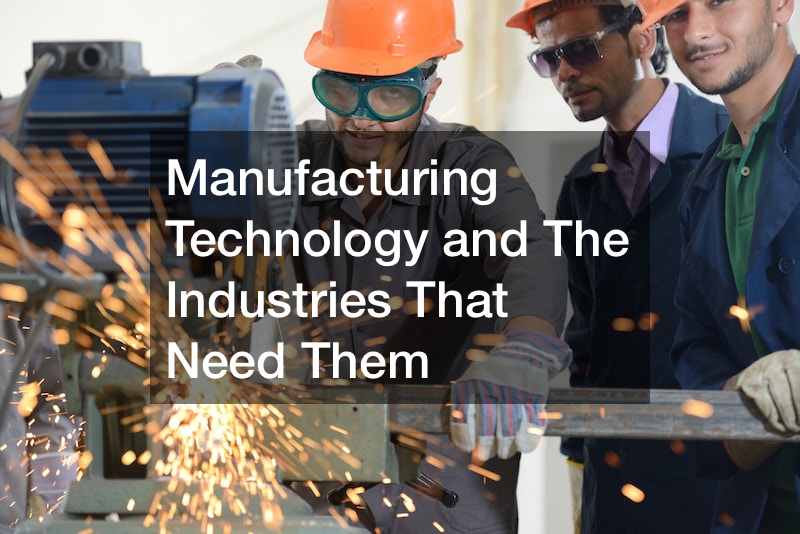Manufacturing Technology and The Industries That Need Them

In an era of rapid industrialization and technological advancement, the role of manufacturing technology cannot be overstated. Manufacturing technology and the industries that depend on it are tightly intertwined, shaping each other in a continuous cycle of innovation and application. This article explores this symbiotic relationship, delving into how various sectors utilize modern manufacturing technologies to streamline operations, enhance productivity, and, ultimately, deliver superior products and services.
From specialized installations such as wheelchair ramp setups to intricate processes like batch manufacturing, we’ll take you through the fascinating world of manufacturing technology and the industries that need it. Uncover the behind-the-scenes activities that keep our modern world running smoothly. Read on to learn more.
Enhancing Accessibility: A Deep Dive into Specialized Installations

In manufacturing technology and the industries that utilize it, enhancing accessibility has become a notable focus. Particularly, the installation of wheelchair ramps stands out as a prime example of how specialized installations make a significant difference. Wheelchair ramp installation, often overlooked, is a crucial aspect of our built environment.
It’s not simply about laying down a slab of concrete or metal. It’s a meticulous process that involves careful planning, precise measurements, and expert execution. When it comes to ramp installations, there’s no one-size-fits-all approach. Various factors include the user’s specific needs, the location’s layout, and even local building regulations.
That’s where manufacturing technology steps in. Advanced design software and precision machinery allow custom-built ramps that meet each unique requirement. Moreover, we’re seeing an increase in portable and modular ramp solutions.
These aren’t just beneficial for temporary setups like events or construction sites; they’re also a lifeline for individuals who may not have the means for a permanent installation at home. But it doesn’t stop there. Innovations continue to push the boundaries. For instance, some companies are exploring using recycled materials in ramp construction, contributing to sustainability efforts.
In the grand scheme of things, wheelchair ramp installation may seem like a small cog in the vast machine of manufacturing technology and the industries it serves. But these seemingly minor elements often make the most significant impact. By enhancing accessibility, we’re improving individual lives and fostering a more inclusive society. And that’s a goal worth striving for.
Understanding the Intricacies of Production: From Raw Materials to Finished Goods

Diving into the heart of manufacturing technology and the industries it supports, we encounter a world of complex processes and intricate systems. Herein lies the art of transforming raw materials into finished goods. Two key players in this grand orchestra are batch manufacturing and pet perform manufacturing, each with its unique role and contribution.
Batch manufacturing, as the name suggests, involves producing goods in batches or groups. It’s not a continuous, never-ending process but a series of separate production runs. This method offers flexibility, allowing manufacturers to switch between different product types without significant downtime.
In the context of manufacturing technology, batch production has been revolutionized. Automation and robotics have streamlined the process, reducing manual labor and increasing efficiency. Imagine a bakery: instead of a baker manually mixing ingredients for each batch of bread, automated mixers, and ovens handle the task, churning out consistent, high-quality loaves every time. That’s batch manufacturing in action.
On the other end of the spectrum, we have a pet preform manufacturer. PET, or Polyethylene Terephthalate, is a versatile plastic used widely in packaging, especially for food and beverages. A PET preform is a ‘blank’ that can be heated and blown into the desired shape, like a bottle or jar. PET preform manufacturing is a testament to how far manufacturing technology has come. The process involves precise injection molding machines, which control temperature, pressure, and cycle times to produce consistent preforms. There’s also meticulous quality control, ensuring each preform meets the highest standards before heading off to become a bottle for your favorite drink.
Both batch and PET preform manufacturing highlight the intricacies of producing finished goods from raw materials. They show us that there’s a symphony of processes behind every product we use, powered by advanced manufacturing technology. And it’s this technology that continues to propel industries forward, driving innovation and shaping our everyday lives.
Behind the Scenes: The Role of Key Manufacturers in Industry Maintenance
In the vast landscape of manufacturing technology and the industries it serves, some unsung heroes keep the wheels turning. They work behind the scenes, ensuring the machinery we rely on runs smoothly and efficiently. Among them, industrial lubricant manufacturers play a vital role.
When thinking about manufacturing technology, industrial lubricants may not be what springs to mind, but their importance can’t be understated. They’re the lifeblood of machinery, reducing friction, preventing wear and tear, and enhancing performance. Without them, the gears grind to a halt.
An industrial lubricant manufacturer is a key player in industry maintenance. They’re responsible for producing high-quality lubricants tailored to various applications. Each requires a specific type of lubricant to function optimally, from heavy-duty mining equipment to delicate medical devices.
The process of manufacturing these lubricants is a complex one. It involves carefully selecting and blending base oils and additives to create a product that meets the unique demands of different machinery. This is where the marriage of chemistry and technology comes into play. Sophisticated testing equipment ensures consistent quality, while automation streamlines production.
However, the role of an industrial lubricant manufacturer extends beyond production. They also conduct extensive research and development, continually innovating to meet the evolving needs of various industries. They work closely with equipment manufacturers, understanding their requirements and developing lubricants to match.
Moreover, with the growing emphasis on sustainability, many lubricant manufacturers are exploring eco-friendly alternatives. Bio-based lubricants, for instance, are derived from renewable resources and offer similar, if not better, performance than their conventional counterparts. Industrial lubricant manufacturers are the silent custodians of our industries. Their products keep machines running smoothly, prolong their lifespan, and ultimately ensure the seamless operation of manufacturing processes. They’re a testament to how manufacturing technology doesn’t just create products but also maintains the industries that depend on them.
The Art of Defining Boundaries: An Overview of Durable Construction Solutions

In the realm of manufacturing technology and the industries it supports, a subtle art exists- defining boundaries. It’s a world where fences and metal siding contractors come into play, providing durable construction solutions that stand the test of time. While seemingly simple structures, fences are important in residential and commercial spaces. They serve various functions, from marking property lines and enhancing privacy to improving security and adding aesthetic value. However, the strength and durability of these fences largely depend on the materials used and the manufacturing processes involved.
Manufacturing technology has revolutionized the way fences are made. The technology ensures consistent quality and efficiency, from automated welding machines to precision cutting tools. Moreover, advancements in materials science have led to the development of stronger, more durable fencing materials. Whether vinyl resists weathering or metal that withstands physical impact, fences today are built to last.
We find metal siding contractors on the other side of the boundary spectrum. These professionals specialize in installing metal sidings – a popular choice in commercial and industrial buildings due to their durability and low maintenance requirements. Metal siding contractors rely heavily on manufacturing technology. The fabrication of metal panels involves precise machinery that cuts and shapes the material to exact specifications. Additionally, advancements in coating technology offer enhanced protection against rust and corrosion, further increasing the siding’s lifespan.
But it’s not all about durability. Aesthetics also play a crucial role. Today’s manufacturing technology allows various finishes and colors, enabling metal sidings to mimic other materials like wood or stone. This means buildings can enjoy the durability of metal while maintaining a desired look and feel.
Fences and metal siding contractors are integral to the art of defining boundaries. They leverage the latest manufacturing technology to provide durable construction solutions, ensuring our spaces are well-defined and well-protected. And in doing so, they contribute significantly to the industries they serve.
On the Road: Essential Tools and Equipment for the Modern Transport Industry
In the bustling world of manufacturing technology and the industries it supports, one sector is a lifeline to them all – transportation. The modern transport industry isn’t just about moving goods from point A to B. It’s an intricate network that relies heavily on truck equipment and services like equipment rental to keep the wheels turning.
Truck equipment forms the backbone of the transport industry. Each component is crucial, from the engines that power the vehicles to the trailers that carry the load. And behind these essential tools is a sophisticated manufacturing process powered by cutting-edge technology.
Consider, for instance, the production of truck engines. These powerhouses are the result of meticulous engineering and precision manufacturing. Advanced machining processes ensure every part fits together perfectly, while automation and robotics boost efficiency and consistency in assembly lines.
But it’s not just about the hardware. Software also plays a significant role in modern truck equipment. Fleet management systems, for example, leverage GPS technology and data analytics to monitor vehicle performance, fuel consumption, and route optimization.
Next in line is equipment rental, a service that’s become increasingly important in today’s fast-paced and flexible business environment. Renting equipment offers numerous advantages, such as reducing upfront costs, providing access to the latest technology, and allowing scalability. Equipment rental companies owe their success to manufacturing technology.
They rely on manufacturers to produce high-quality, durable, and reliable equipment. Moreover, they must keep up with technological advancements to stay competitive and meet customer demands. For instance, the rise of telematics has made it possible to track and manage rented equipment remotely, enhancing efficiency and accountability. So, whether it’s manufacturing robust truck equipment or facilitating flexible equipment rental services, manufacturing technology plays a pivotal role in the modern transport industry. It’s a testament to how technology and industry go hand in hand, driving progress and innovation on the road to success.
Shaping the Future: The Importance of Metalwork in Today’s Industries

One discipline plays a pivotal role in the grand scheme of manufacturing technology and the industries it underpins – metalwork. At the heart of this is metal fabrication, a process that shapes and molds the industrial world as we know it. And at the forefront of this process are the local metal fabrication companies.
Metal fabrication is the art and science of transforming raw metals into functional components used in various industries. Metal fabrication creates many products we use daily, from automotive parts to building structures. But this process wouldn’t be possible without the advancements in manufacturing technology.
Modern manufacturing technology has revolutionized the way metal fabrication is done. High-precision cutting tools, automated welding machines, and advanced computer software have made the process more efficient and accurate. For instance, CNC machines can produce complex parts with exact specifications, which was unimaginable a few decades ago.
But it’s not just about the technology. The skills and expertise of those who operate these machines also matter. This is where a local metal fabrication company comes into play. These companies are home to skilled craftsmen who combine their knowledge with the power of technology to produce high-quality products.
Local metal fabrication companies are more than just production facilities. They’re innovation hubs, continually adapting to technological changes and industry demands. They work closely with their clients, understanding their unique needs and providing customized solutions. This close collaboration allows them to stay flexible and responsive, key attributes in today’s fast-paced industrial landscape.
Moreover, these companies contribute significantly to their local economies. By employing local workers and sourcing materials locally, they help circulate money within the community, fostering economic growth. Metalwork, particularly metal fabrication, is integral to shaping the future of industries. Local metal fabrication companies are helping build a more functional and sustainable world through the fusion of traditional craftsmanship and modern technology. They’re a testament to the power of manufacturing technology and its role in driving industrial progress.
Manufacturing technology is an integral cog in the machinery of modern industry. As we’ve explored throughout this article, its applications span many sectors – from aerospace to electric vehicles, from robotics to pharmaceuticals. Adopting advanced tools and processes, such as automation, 3D printing, and computer vision, is shaping our industrial landscape, driving economic growth, fostering innovation, and enhancing competitiveness. In essence, manufacturing technology and the industries that rely on it are inseparable, each propelling the other towards new frontiers of progress and productivity. Through continuous advancements and adaptations, they are collectively scripting the future of our global economy.


